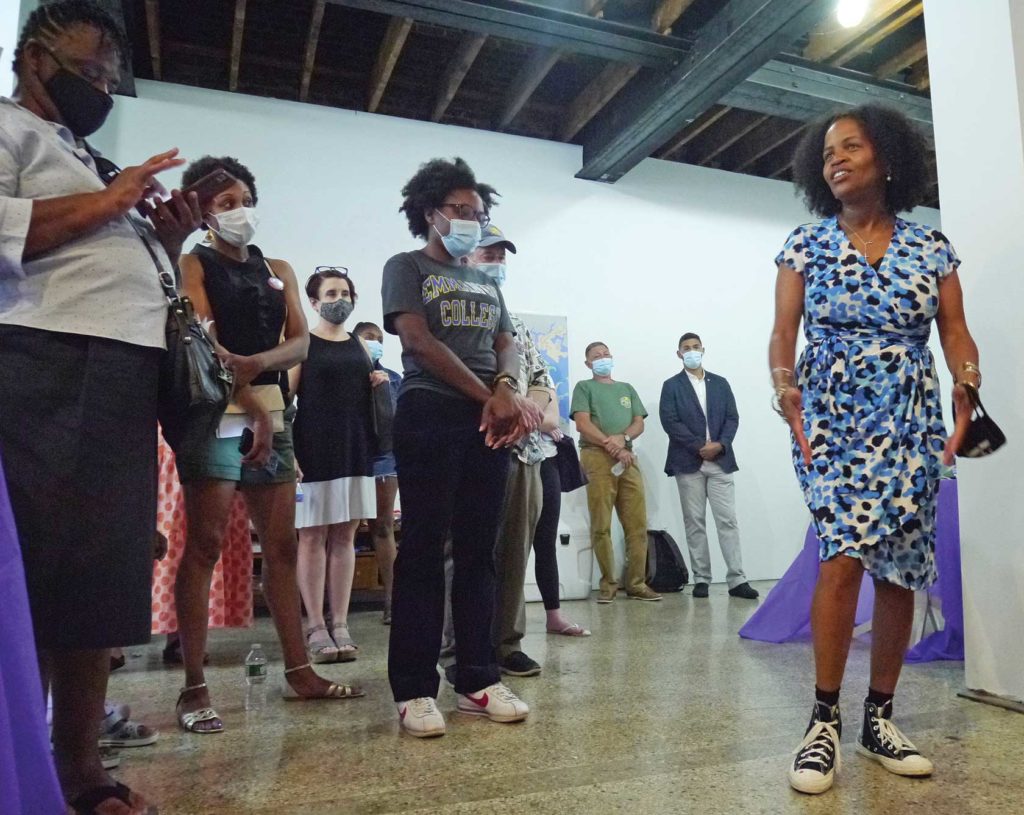Janey, Wu vying for progressive support
JP Progressives split support between top contenders

Political insiders are betting on the campaigns of acting Mayor Kim Janey and At-Large City Councilor Michelle Wu, with the pair receiving the lion’s share of backing from the city’s politicians, unions and base-building groups.
Last week, however, when JP Progressives was due to make an endorsement, the group’s internal deliberations ended in somewhat of a King Solomon split, with nearly half the members backing Wu and nearly half backing Janey. District 4 City Councilor Andrea Campbell came in a distant third.
“It’s safe to say progressives are evenly split between the two,” said Annie Rousseau, a co-chair of the group. “We’ll see what happens in September.”
The group’s nod would have been an important boost to either Janey or Wu, whose campaigns were running neck-and-neck in polls conducted earlier in the summer. Since 1993, when Thomas Menino won the mayor’s seat, winning candidates in citywide races have depended on a coalition of white progressives and Black, Latino and Asian voters for victory.
“You can’t win any other way,” said District 6 City Councilor Ricardo Arroyo. “No candidate is capable of winning citywide without a coalition.”
J.P. Progressives played a pivotal role in Nika Elugardo’s victory over incumbent state Rep. Jeffrey Sanchez in the 2018 race for the 12th Suffolk District. The group helped educate and mobilize voters in Ward 19, boosting turnout there higher than in any other ward in the city. That year, Ward 19 also delivered strong support to Rachael Rollins’ bid for the Suffolk County District Attorney’s seat and Ayanna Pressley’s candidacy for the Massachusetts 7th Congressional District.
So far Janey appears popular with the political establishment in communities of color. She was endorsed by Right to the City VOTE, the Chinese Progressive Association and the immigrant rights group Mijente. Additionally, she’s scored endorsements from Suffolk County Register of Probate Felix D. Arroyo, Ricardo Arroyo, state Rep. Nika Elugardo and former District 7 Councilor Tito Jackson.
Wu, on the other hand, appears to be running strong with white progressives. She has been endorsed by West Roxbury/Roslindale Progressives (a sister organization to JP Progressives). She has also received the backing of the environmental justice group Sunrise Boston, Sen. Elizabeth Warren, District 1 City Councilor Lydia Edwards, Middlesex and Suffolk state Sen. Sal DiDomenico, whose district includes Charlestown and part of the West End, and seven other legislators whose districts do not include Boston.
Both candidates have the backing of union locals that represent significant populations of Black, Latino and Asian workers in Boston.
The only other candidate in the race with significant endorsements from local elected officials of color is Andrea Campbell, who last week secured an endorsement from Roxbury-based state Rep. Chynah Tyler and has the backing of former Suffolk County Sheriff Andrea Cabral, state Rep. Liz Malia and former state Reps. Marie St. Fleur and Marty Walz.
The JP Progressives split vote came after the group’s executive committee recommended endorsing Janey.
Last Thursday, co-chairs Rousseau and Ed Burley were among members of the group who showed up at a canvassing event held in Janey’s Hyde Square office, where Tito Jackson fired up the crowd.
Jackson told the Banner he is encouraged by Janey’s strong showing in the predominantly white Jamaica Plain, as well as in the predominantly Black and Latino Roxbury, where she lives.
“Roxbury and Jamaica Plain are critical to a win,” he said.
The importance of Black, Latino and Asian voters
For decades, as Boston’s Black and Latino communities grew in numbers in the center of the city, white communities in peripheral neighborhoods such as South Boston, Neponset, Readville and Charlestown dominated electoral politics.
With 45% of the city’s population, whites are still the largest racial group in the city. In recent electoral cycles, however, the strength of white neighborhoods has diminished as working-class white voters are being displaced by well-heeled but low-voting white professionals.
In the pivotal 2018 election, in which Ayanna Pressley and Rachael Rollins scored upset victories over white opponents, South Boston’s Ward 6 and 7 voter turnout percentages for the first time in recent memory were lower than that in Roxbury’s Ward 12.
As was the case in 2018, women of color are poised to make significant political gains in this year’s race. John Barros, who placed dead last in the most recent publicly released mayoral poll, is the sole man vying for the office. Once again, Black, Latino and Asian voters may play a decisive role in the race.
Because Janey has more backing in communities of color, political consultant Anthony Collins said, Wu will likely have to rely more heavily on support from white progressive communities such as Jamaica Plain, Allston, Brighton and Roslindale.
“If Jamaica Plain can’t deliver the big win she thought it would, that’s got to change her plans,” Collins said.







